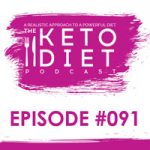I want...
Keto Pregnancy, Breastfeeding, and More
November 3, 2018 By
Leanne Vogel

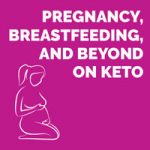 October 25, 2019
October 25, 2019
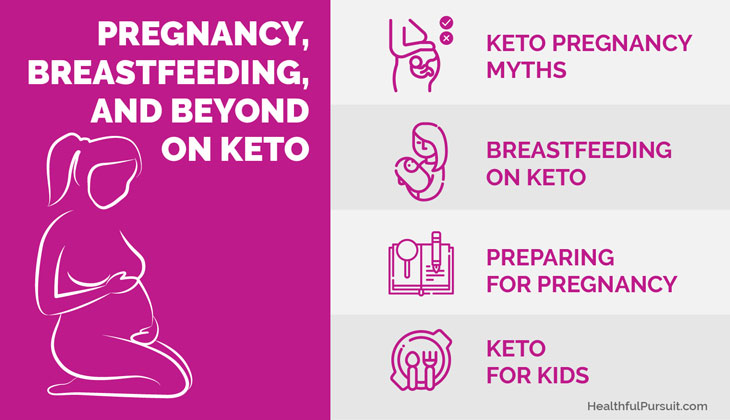
A healthy pregnancy is top priority for you as a mom. You want to keep up your energy levels and make sure that you’re keeping your eating habits healthy–after all, before you know it, you’re going to have a baby to chase around the house! If you’re looking for a great way to stay healthy and fit throughout your pregnancy, the keto diet is a great place to start.
Dangers | Preparing for Pregnancy | While Pregnant | Keto and Your Baby | Breastfeeding
Busting the Myths of Keto: Pregnancy Dangers
All too often, keto gets a bad rap. You hear all sorts of rumors about how it could impact your pregnancy, and unfortunately, it doesn’t sound like a great idea. Maybe some of these sound familiar:
Myth: Ketosis is dangerous for pregnancy because of the potential for ketoacidosis. This couldn’t be more wrong!
Myth: Ketosis could be harmful for baby. The reality is, our bodies–especially our pregnant bodies–dip into ketosis while we’re asleep regardless of whether or not we’re following a ketogenic diet! This is a natural state for our bodies, and it’s certainly not harmful for the developing fetus.
Myth: The keto diet contains too much fat, making it potentially harmful for mom and baby. The truth is, fats are a key structural part of every human cell. They’re also the preferred energy source of the mitochondria, the fuel-burning center of the cell. Babies naturally start burning ketones while in utero, and that pattern continues naturally once the baby is born.
Someday Moms: Not Pregnant Yet
Being a mom is top priority in your life. You want to be as healthy as possible going into pregnancy so that you’ll be healthy throughout your pregnancy, giving your baby the best possible start! For you, the keto diet offers a number of key benefits.
The keto diet is an awesome whole foods diet. It focuses on eating real foods that can fuel your body and give you the energy you need to tackle your daily tasks. Not only that, eating whole foods can help restore balance to your body, making it easier for you to get pregnant.
Let the keto diet balance your cholesterol levels. Balanced cholesterol levels can in turn help balance your hormones, making it easier for you to get pregnant and keeping you more stable throughout your pregnancy.
When you’re on the keto diet, you’ll experience fewer blood sugar highs and lows. You’ll be more energetic and have more stamina as well as benefiting from the balance that comes along with stable blood sugar. This can also help make it easier for you to get pregnant.
Lose that extra weight that’s slowing down your conception efforts. If you’re overweight, one of the first things your doctor will tell you when you’re trying to get pregnant is to lose that extra weight. For many women, the keto diet is a quick way to lose that extra weight and jump start the fertility increase they’re hoping for.
Expecting Moms: While You’re Pregnant
You’re pregnant, and, like most moms-to-be, you’re worrying about everything. You want to give your baby the best possible start in life from the very beginning.
If you were on the keto diet before pregnancy, keep at it! This diet is in no way harmful to your baby, and you’ll continue to experience the benefits of the keto diet throughout the pregnancy and beyond.
Pay attention to your body. During your second trimester, you may find that you need more carbs to help support your developing body. In the third trimester, this number will decrease again. Pay attention to your body and the cues it’s giving you. You’ll know what you really need to keep you and baby as healthy as possible!
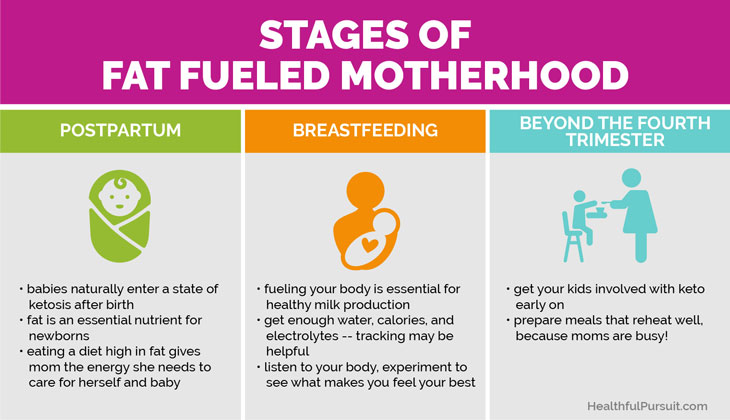
Keto and Your Baby
Research shows that immediately after birth, babies naturally enter a state of ketosis. They remain in this normal, healthy state throughout the breastfeeding process. Yes, you read that right: babies naturally stay in ketosis, helping them to burn the healthy fats they’re taking in through breastfeeding and giving them the fuel they need to grow and develop.
Furthermore, research confirms that breast milk from healthy mothers is actually made up of 50-60% fat, and the cholesterol in breast milk supplies babies with almost six times the amount that most adults consume in their diets. This naturally reflects the keto lifestyle–so why would it be a problem for mom to continue the keto diet while breastfeeding? It’s a natural state that will allow baby to experience all the benefits of the healthy fats in Mom’s breast milk–and may in fact give Mom more energy and make her feel more like herself sooner.
What Research Says about Breastfeeding and Keto
Unfortunately, there’s not a lot of research out there about the keto diet and breastfeeding specifically. There is, however, a study performed in 2009 that compared a low-carbohydrate, high fat (LCHF) diet to a high-carbohydrate, low fat (HCLF) diet in breastfeeding women–the LCHF diet being very similar to what women will enjoy while following the keto diet. Here are the key takeaways:
Following a specific type of diet didn’t seem to have an impact on milk production. Women on both types of diets were equally able to produce the breast milk their babies needed. If your milk production starts to slip while you’re on the keto diet, check your calorie consumption: it’s possible that you’re not giving your body the fuel it needs to keep providing food for your baby. You should also make sure that you aren’t dehydrated, which can also lower breast milk supply.
A low carbohydrate, high fat diet — the one closest to keto — offered more good fats and higher calories in the milk. Babies who were given this type of breast milk tended to have more energy.
Both moms and babies had more energy on the high-fat, low-carb diet. When you have an infant at home, more energy is always a benefit!
Ultimately, moms who were able to maintain a low-carb, high-fat diet were able to lose weight more easily and maintain higher energy levels while breastfeeding–a definite plus for moms of all shapes and sizes! A literature review from 2016 admitted that, while there are few studies on the issue, it seems that Mom’s diet doesn’t have a big impact on the nutrients baby gets through breastmilk–the most important takeaway for a mom who wants to get her energy levels up and lose weight while still keeping baby healthy.
Successfully Following the Keto Diet While Breastfeeding
Are you ready to dive in with the keto diet? If you’re still breastfeeding, there are several steps you can take that will ultimately help you be more successful in reaching your goals.
Step One: Start Early
There’s an adjustment period when you first start into the keto diet. During this period, you may have to deal with the keto flu, which may make you feel as though something is wrong–and that’s not something you want to have to deal with in the early days of nursing or when you’re struggling with other postpartum issues! If you have the option, start the keto diet during your pregnancy–or even before it. Note that a keto diet can even help increase your odds of getting pregnant, making it an ideal choice no matter where you are in your journey to motherhood.
Step Two: Avoid Dehydration
When you’re nursing, drinking enough water is critical! Dehydration can quickly drop your milk production, leaving you struggling to provide what your baby needs. Your body uses water to produce breast milk, recover from labor and delivery, and keep you healthy. Not only that, you need extra water and electrolytes when you’re on the keto diet. Make sure you’re drinking enough to help reach your goals! This Keto lemonade recipe can help ensure that you’re getting plenty of flavor with your water intake–not to mention decreasing the symptoms of the keto flu.
Step Three: Check Nutrients and Electrolytes
Consuming the right nutrients and electrolytes is critical to maintaining your balance when you’re on the keto diet. Failure to balance those elements can lead to a lightheaded feeling, headaches, loss of energy, and other problems. I created a video recently that outlines the importance of electrolytes on the keto diet.
Step Four: Consume Enough Calories
You want to lose weight, but that doesn’t mean you should restrict yourself too much! Consuming the right number of calories every day will keep you producing the milk your baby needs while keeping you strong.
Step Five: Eat Those Veggies!
The right fruits and vegetables are critical to the health and development of your baby–not to mention keeping you nourished! Make sure you are consuming lots of vegetables to ensure adequate intake of certain phytochemicals and antioxidants. Knowing what keto-safe vegetables that will help you move through the process in a healthy way.
Short on time? Honestly, who has time to prepare fresh veggies with a baby in the house? If that sounds familiar, try using a green supplement to keep you and baby both nourished.
Step Six: Try Moderate Carbohydrate Restriction
If you find that you struggle with milk production on a strict keto diet, start with a more moderate approach. Start with around 50-75 grams of carbs per day, then gradually lower the amount by 5-10 carbs per day until you find the balance that works for your body. Remember that every body is different, and you’re looking for a solution that works for you and your baby!
Step Seven: Track Your Food and Milk Production
If you notice dips or increases in your milk supply, try tracking your food intake and your milk production. Apps like MyFitnessPal can help you get a better understanding of how your food intake impacts your milk production, allowing you to make better decisions that will help you keep your body operating at peak efficiency. Tracking calorie intake may also help you understand your energy levels and other key concerns.
Do remember that babies extract more breast milk than a pump, so keep track of baby’s cues. Does baby seem satisfied? If so, chances are, you’re producing plenty of milk.
Current Moms
Tackling the keto diet with children at home can feel like a daunting challenge–but it’s well within your capability. Try some of these tips to make your new lifestyle easier.
Pay attention to what you know about your baby. Breast milk is much higher in healthy fats than formula, which is filled with carbohydrates and sugar. Breastfed babies spend more time in ketosis, which is great for their development!
Get your kids involved in the new diet! Let them help you come up with new recipes, prepare meals, and more.
You’ll have better success when you put yourself first. You can’t take care of your kids as effectively when you don’t have the energy you need for yourself.
Prepare yourself for success. Get an InstantPot, cook ahead of time, and meal prep: you’ll find that if you set yourself up for success, you’re less likely to “cheat.”
Have quick food options on hand. This might include fat bombs, fatty coffees, beef or turkey sticks, or bone broths with the fats blended in. Having ready snacks on hand will make it easier for you to meet your goals even when you’re busy–and what mom isn’t?
A keto diet is a great option for moms in all stages of parenthood, but you need to know the facts, not the myths. Which is why it’s so important to me that we educate ourselves on a well rounded ketogenic diet. You can find out more about how to use whole foods to balance your body with my keto guide, The Keto Bundle. A complete meal plan, 300+ pages of keto how-to, all for women.
Loved This Keto Content? Share on Pinterest!
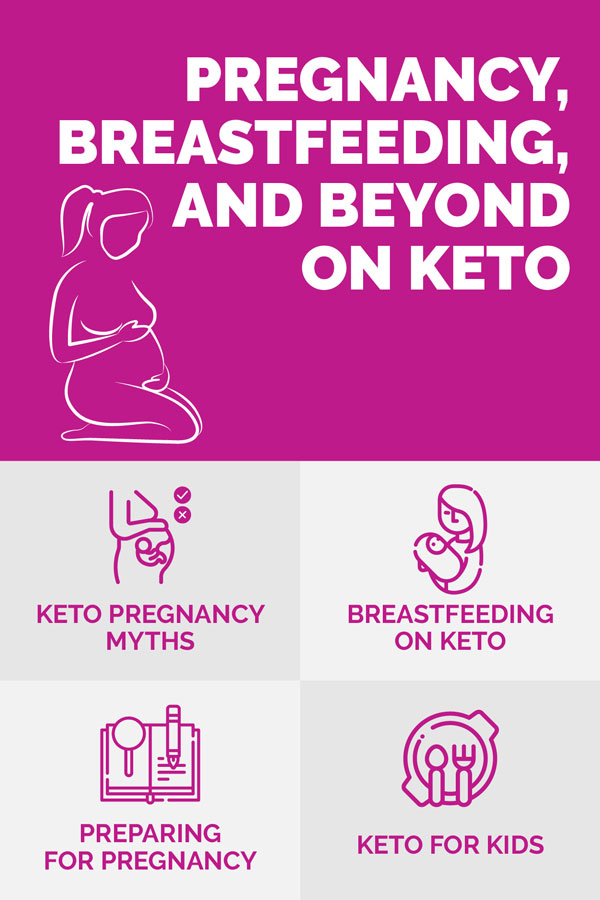
This entry was tagged: eating high-fat, eating keto, eating low-carb, fat-adapted, health, high fat, holistic nutrition, how eat keto, keto, keto basics, keto diet, keto for women, keto life, ketogenic, ketogenic diet, ketogenic for women, ketosis, low-carb, what is keto
Hi! I'm Leanne (RHN FBCS)
a Functional Medicine Practitioner, host of the Healthful Pursuit Podcast, and best-selling author of The Keto Diet & Keto for Women. I want to live in a world where every woman has access to knowledge to better her health.

